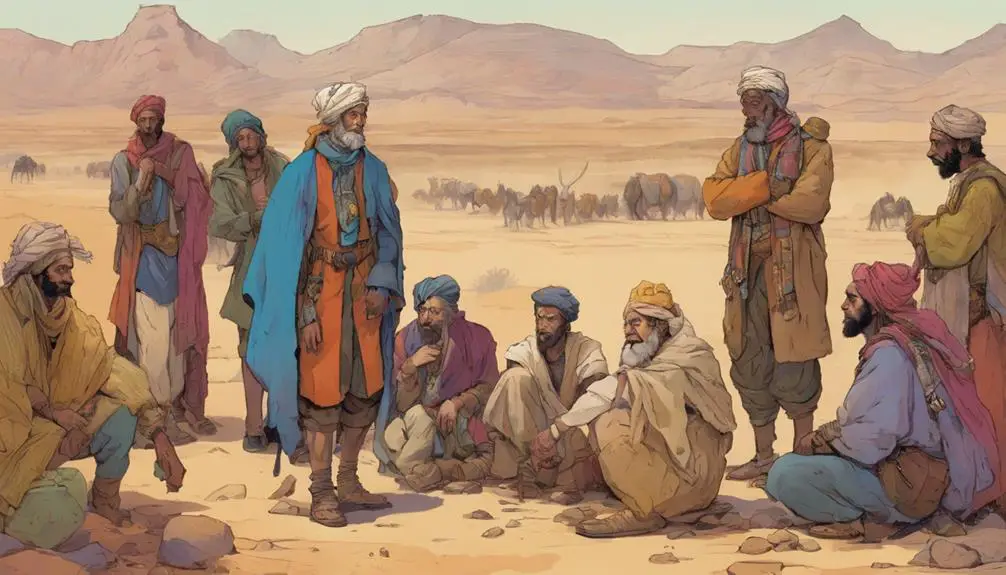Journey through biblical narratives to unravel the devastating consequences of jealousy and discover timeless wisdom for navigating this destructive emotion.

Consequences of Jealousy in the Bible
Consider the story of Cain and Abel, the first sons of Adam and Eve. Cain, driven by jealousy of his brother's favor with God, committed the first murder in human history. It's a powerful example of how jealousy can provoke extreme actions and lead to devastating consequences.
But, what does the Bible teach us about handling this intense emotion? How can we mitigate its destructive potential in our own lives? You might be surprised at the wisdom that ancient scripture offers on this pressing, contemporary issue.
Key Takeaways
- Biblical stories highlight the destructive effects of jealousy leading to murder, betrayal, and adultery.
- Contrasts in character and consequences reveal the detrimental outcomes of jealousy and disobedience.
- Wisdom teachings in the Bible emphasize the importance of guarding the heart against jealousy.
- Despite the destructive power of jealousy, biblical narratives show the potential for redemption and transformation through repentance and forgiveness.
Cain's Envy: Abel's Untimely Death

Why did Cain, driven by jealousy, take the life of his own brother Abel, marking the first recorded act of fratricide in the Bible? You'll find that this act was rooted in resentment and envy, an emotion that, when left unchecked, can lead to destructive consequences.
Delving into Cain's regret, it becomes clear that his actions weren't only driven by envy but also by a deep-seated sense of inadequacy. Cain was the older brother, the one who should have been more successful in his offerings to God. Yet, it was Abel, the younger, who found favor in God's eyes. This perceived unfairness drove Cain to commit the ultimate sin.
On the other hand, Abel's legacy is one of righteousness and favor. He's remembered not for his untimely death, but for his unwavering faith. His offering was accepted by God because it was given with a pure heart, not out of obligation or expectation, but out of genuine love and respect for his Creator.
In essence, the story of Cain and Abel serves as a cautionary tale. It highlights the destructive power of jealousy and the importance of a pure heart in worship.
Saul's Resentment Towards David

Diving deeper into the annals of biblical narratives, you'll encounter King Saul, whose simmering resentment towards David presents another potent illustration of the corrosive effects of envy. This resentment brings to light Saul's downfall, a consequence of his jealousy and David's patience.
Consider the following table:
Saul's Actions |
David's Reactions |
|---|---|
Saul tries to kill David |
David spares Saul's life |
Saul's irrational jealousy |
David remains patient |
Saul's disobedience to God |
David obeys God |
Saul's downfall |
David's rise to kingship |
Saul's persistent attempts to assassinate David, fueled by his irrational jealousy, are met with David's remarkable patience and mercy. His disobedience to God juxtaposes David's obedience, further highlighting the stark contrast between their characters. Saul's downfall is a direct result of his envy, while David's rise to kingship is symbolic of his moral endurance.
Joseph's Brothers Sell Him Into Slavery

In a twist of fraternal treachery, Joseph's brothers succumb to the green-eyed monster of jealousy, selling him into slavery, which serves as another profound instance of envy's destructive power in biblical narratives. This act, born out of sibling rivalry, demonstrates how jealousy can beget betrayal, even among kin.
Joseph's unique talent for dream interpretation, a gift that earned him their father's favor, inflamed his brothers' resentment. Their envy transformed into an insidious force, compelling them to conspire against him. Instead of celebrating his gift, they saw it as a threat and, in their jealousy, chose to silence him.
Theological analysis of this narrative reveals a cautionary tale about the corrosive effects of jealousy. It serves as a stark reminder that unchecked envy can lead to unthinkable actions. The brothers' decision to sell Joseph into slavery is a potent illustration of how jealousy can distort our perception of others and drive us towards destructive behavior.
Jealousy and Adultery: David and Bathsheba

Continuing our exploration of jealousy's influence in biblical narratives, let's turn our attention to the infamous story of David and Bathsheba, a tale where jealousy intertwines with lust, leading to adultery. While many focus on David's lustful gaze and subsequent actions, it's crucial to analyze Bathsheba's perspective. As a woman in a patriarchal society, her voice is often overlooked. Yet, her experiences offer profound insights into the destructive power of jealousy.
David's actions, driven by covetous desire, led him down a path of deceit and murder. Yet, it's in David's repentance where we see the transformative power of grace. After being confronted by the prophet Nathan, David recognized his sins and sought God's forgiveness. This pivotal moment signifies the potential for redemption even in the face of grave wrongdoing.
However, the consequence of David's jealousy wasn't erased by his repentance. The fallout of his actions impacted not just Bathsheba, but also their child, and the entire kingdom of Israel. This story serves as a stark reminder of how jealousy, when left unchecked, can lead to destructive consequences.
Lessons From Solomon on Guarding the Heart

Shifting our focus now to Solomon, we can glean valuable lessons about the necessity of guarding one's heart against jealousy. Solomon's wisdom, extensively documented in the Bible, provides profound insights into heart protection.
You may recall Solomon's prayer for wisdom rather than wealth or power (1 Kings 3:5-14). His discernment was rooted in understanding the human heart's capabilities for both good and evil. He acknowledged, 'Above all else, guard your heart, for everything you do flows from it' (Proverbs 4:23).
This profound statement signals a warning against jealousy. It's a destructive emotion that can corrode the heart, leading to disastrous consequences like anger, bitterness, resentment, and even violence. Solomon's wisdom cautions that you must guard your heart vigilantly, keeping it free from such negativity.
Furthermore, Solomon's teachings emphasize the importance of maintaining a heart filled with love, kindness, and understanding. This disposition effectively fortifies the heart against jealousy's corrosive influence. Solomon's wisdom rightly asserts that heart protection is a crucial element in living a life that aligns with God's teachings.
Frequently Asked Questions
What Does the Bible Say About Overcoming Jealousy in Romantic Relationships?
The Bible advises you to overcome jealousy in romantic relationships by understanding jealousy's roots. It promotes Godly love, which is selfless and patient, not envying or boasting. It encourages you to trust your partner, believe in them, and hope for the best in them.
Jealousy, it implies, stems from insecurity and lack of faith. So, to overcome jealousy, you're suggested to cultivate faith, security, and Godly love.
How Does the New Testament Address the Issue of Jealousy?
You'll find the New Testament addresses jealousy by pointing to its roots in insecurity and fear. It's viewed as spiritual warfare, a destructive force that can disrupt unity and peace.
Scriptures like James 3:14-16 warn against envy and self-seeking, while Galatians 5:19-21 lists jealousy among sinful natures.
It encourages you to combat this with love, kindness, and self-control, promoting a healthier spiritual life.
What Are Some Practical Ways Recommended in the Bible to Deal With Feelings of Jealousy?
To deal with jealousy, the Bible suggests practical ways like understanding jealousy's roots. It's often rooted in discontent or covetousness, isn't it?
Spiritual solutions offered include focusing on gratitude, contentment, and God's love. You're advised to 'rejoice with those who rejoice' and not to covet others' lives.
Self-reflection and prayer are also recommended as effective ways to combat these feelings. Remember, you're loved and valued just as you are.
Are There Any Instances Where Jealousy Is Portrayed in a Positive Light in the Bible?
You're asking if jealousy is ever positive in the Bible.
Interestingly, 'Divine Jealousy' is portrayed as a righteous emotion. God's jealousy is depicted as his intense love and desire for his people's complete devotion.
However, human jealousy often leads to negative consequences. It's crucial to distinguish between these types, understanding that God's jealousy stems from love, whereas ours can often stem from sin.
What Are Some Biblical Prayers or Verses to Help Deal With Intense Feelings of Jealousy?
You're looking for prayers or verses to combat jealousy. Consider James 3:16, 'For where jealousy and selfish ambition exist, there will be disorder and every vile practice.' It's a reminder that jealousy leads to chaos.
Also, meditate on Proverbs 14:30, 'A heart at peace gives life to the body, but envy rots the bones.' This highlights 'Envy Versus Jealousy,' and shows the potential for 'Jealousy's Redemption.'
Conclusion
So, you see, the Bible reveals the devastating effects of jealousy, from Cain's murderous envy to Joseph's brothers' deceit, Saul's resentment of David, and David's own adulterous transgression.
Solomon's wisdom cautions us to guard our hearts, emphasizing the importance of mastering our emotions.
Let's heed these lessons, recognizing the destructive power of jealousy and striving to cultivate love, understanding, and empathy instead.
After all, love is the greatest commandment.



Sign up